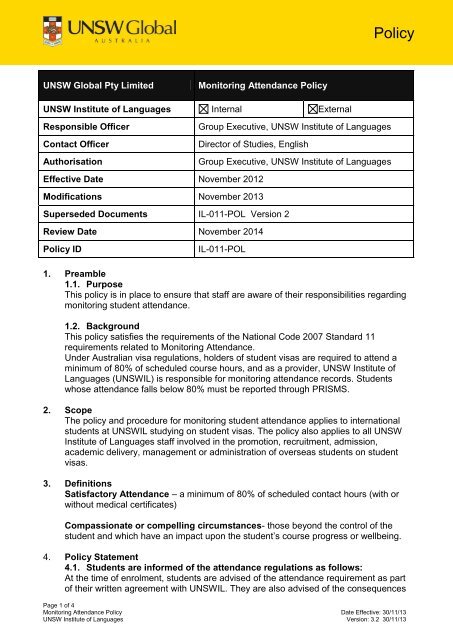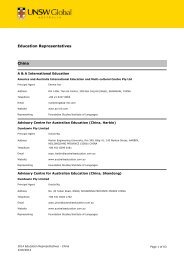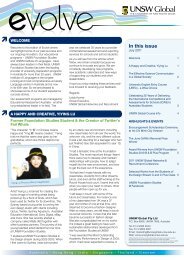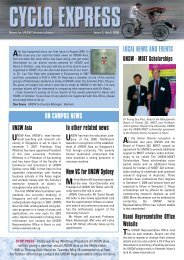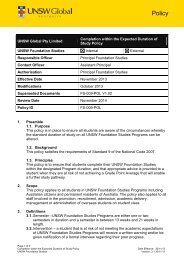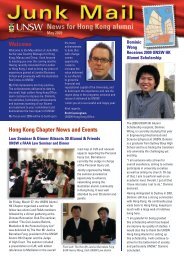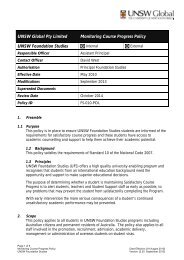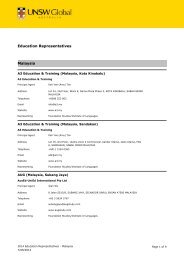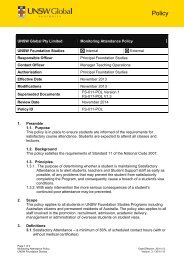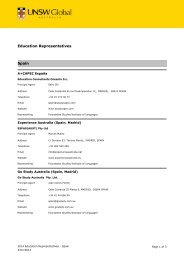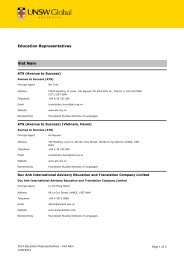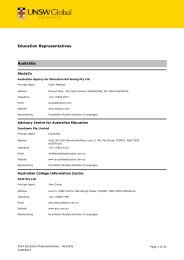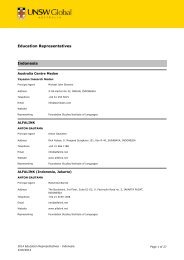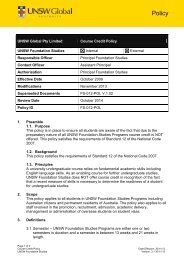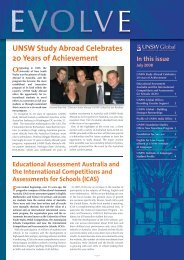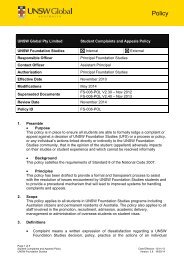Attendance Policy and Procedure - UNSW Global Pty Limited
Attendance Policy and Procedure - UNSW Global Pty Limited
Attendance Policy and Procedure - UNSW Global Pty Limited
Create successful ePaper yourself
Turn your PDF publications into a flip-book with our unique Google optimized e-Paper software.
<strong>Policy</strong><br />
<strong>UNSW</strong> <strong>Global</strong> <strong>Pty</strong> <strong>Limited</strong><br />
Monitoring <strong>Attendance</strong> <strong>Policy</strong><br />
<strong>UNSW</strong> Institute of Languages Internal External<br />
Responsible Officer<br />
Contact Officer<br />
Authorisation<br />
Group Executive, <strong>UNSW</strong> Institute of Languages<br />
Director of Studies, English<br />
Group Executive, <strong>UNSW</strong> Institute of Languages<br />
Effective Date November 2012<br />
Modifications November 2013<br />
Superseded Documents IL-011-POL Version 2<br />
Review Date November 2014<br />
<strong>Policy</strong> ID<br />
IL-011-POL<br />
1. Preamble<br />
1.1. Purpose<br />
This policy is in place to ensure that staff are aware of their responsibilities regarding<br />
monitoring student attendance.<br />
1.2. Background<br />
This policy satisfies the requirements of the National Code 2007 St<strong>and</strong>ard 11<br />
requirements related to Monitoring <strong>Attendance</strong>.<br />
Under Australian visa regulations, holders of student visas are required to attend a<br />
minimum of 80% of scheduled course hours, <strong>and</strong> as a provider, <strong>UNSW</strong> Institute of<br />
Languages (<strong>UNSW</strong>IL) is responsible for monitoring attendance records. Students<br />
whose attendance falls below 80% must be reported through PRISMS.<br />
2. Scope<br />
The policy <strong>and</strong> procedure for monitoring student attendance applies to international<br />
students at <strong>UNSW</strong>IL studying on student visas. The policy also applies to all <strong>UNSW</strong><br />
Institute of Languages staff involved in the promotion, recruitment, admission,<br />
academic delivery, management or administration of overseas students on student<br />
visas.<br />
3. Definitions<br />
Satisfactory <strong>Attendance</strong> – a minimum of 80% of scheduled contact hours (with or<br />
without medical certificates)<br />
Compassionate or compelling circumstances- those beyond the control of the<br />
student <strong>and</strong> which have an impact upon the student’s course progress or wellbeing.<br />
4. <strong>Policy</strong> Statement<br />
4.1. Students are informed of the attendance regulations as follows:<br />
At the time of enrolment, students are advised of the attendance requirement as part<br />
of their written agreement with <strong>UNSW</strong>IL. They are also advised of the consequences<br />
Page 1 of 4<br />
Monitoring <strong>Attendance</strong> <strong>Policy</strong> Date Effective: 30/11/13<br />
<strong>UNSW</strong> Institute of Languages Version: 3.2 30/11/13
<strong>Policy</strong><br />
of poor attendance. All students at the time of enrolment are asked to accept the<br />
conditions of enrolment which includes an undertaking to maintain at least 80%<br />
attendance.<br />
Information on attendance is included in the Student H<strong>and</strong>book. It includes:<br />
the 80% attendance requirement;<br />
the consequences of not maintaining satisfactory attendance;<br />
the requirement to notify <strong>UNSW</strong>IL if the student is sick;<br />
provision of a doctor’s certificate for three or more days absence due to illness;<br />
the information that a student ’s attendance may be affected if more than 30<br />
minutes late to a class.<br />
Students are advised again verbally during orientation, <strong>and</strong> by their teacher on the<br />
first day of classes.<br />
4.2. Monitoring attendance -marking the roll <strong>and</strong> assessing satisfactory<br />
attendance<br />
Teachers must mark the class roll for each session according to the marking code<br />
which is in the student h<strong>and</strong>book, orientation <strong>and</strong> with the class roll.<br />
Teachers must advise their Senior Specialist Teacher (SST) if any student is absent<br />
for three consecutive days without notifying <strong>UNSW</strong>IL.<br />
As soon as is practical teachers will advise their Senior Specialist Teacher of any<br />
students who are habitually late or regularly absent. Class attendance is calculated<br />
weekly.<br />
4.3. Students at risk of not achieving satisfactory attendance<br />
Telephone contact is made by the SST with any student reported as being absent for<br />
three consecutive days, or whose attendance is at risk of falling below 80%.<br />
The student is asked to make an appointment with the SST to discuss reasons for<br />
the absence <strong>and</strong> to be counselled about attendance requirements. A verbal warning<br />
is given <strong>and</strong> an action plan is agreed with the student. If appropriate (eg if poor<br />
attendance is due to homesickness, social or psychological issues), the student is<br />
referred to Student Support for further discussion, advice or referral. The Head of<br />
Studies is informed about the outcome of the interview. A student file note is made to<br />
document the meeting.<br />
If the problem is repeated, up to two written warnings may be given <strong>and</strong> the student<br />
will be asked to attend an interview with the Student Advisor or Director of Studies.<br />
Documentary evidence of the reason for absence (eg medical certificates) will be<br />
requested <strong>and</strong> copies filed in the student's file at Student Services. A student file note<br />
is made to document the meeting <strong>and</strong> the student signs the bottom portion of the<br />
warning letter to indicate s/he received it <strong>and</strong> attended an interview.<br />
4.4. Students unable to achieve satisfactory attendance<br />
Students who are no longer able to achieve 80% attendance for the period of their<br />
CoE will be given written notice of the Intention to Report for Unsatisfactory<br />
<strong>Attendance</strong> to DIBP through PRISMS.<br />
Page 2 of 4<br />
Monitoring <strong>Attendance</strong> <strong>Policy</strong> Date Effective: 30/11/13<br />
<strong>UNSW</strong> Institute of Languages Version: 3.2 30/11/13
<strong>Policy</strong><br />
The student will be informed of their right to access the <strong>UNSW</strong>IL Appeals process,<br />
given twenty (20) working days to do so <strong>and</strong> warned that attendance will continue to<br />
be monitored during that period. The <strong>UNSW</strong>IL Complaints <strong>and</strong> Appeals policy is<br />
documented <strong>and</strong> available to students on the <strong>UNSW</strong>IL website <strong>and</strong> the student<br />
intranet.<br />
If the student’s appeal is unsuccessful, s/he is reported to DEEWR through PRISMS.<br />
PRISMS generates a Section 20 breach notice which is sent to the student. A copy is<br />
kept on the student’s file.<br />
4.5. Compassionate or Compelling Circumstances<br />
In the following circumstances, the Director of Studies, in consultation with the Head<br />
of Studies, Senior Specialist Teacher <strong>and</strong> Student Advisor, may decide not to report<br />
a student for breaching the 80 percent attendance requirement provided that:<br />
The student is maintaining satisfactory course progress.<br />
The student’s attendance is at least 70 percent, <strong>and</strong><br />
The student produces documentary evidence clearly demonstrating that<br />
compassionate or compelling circumstances apply.<br />
Note:<br />
<strong>Attendance</strong> is calculated over the period covered by the student’s Confirmation of<br />
Enrolment (CoE). If a student changes course <strong>and</strong> receives a new CoE, or extends<br />
his or her enrolment in the current course, thereby receiving a new CoE, the<br />
student's attendance is monitored over each of the CoEs separately, rather than over<br />
the entire period of the student’s enrolment.<br />
5. Legal <strong>and</strong> <strong>Policy</strong> Framework<br />
This policy complies with:<br />
the Education Services for Overseas Students (ESOS) Act (2000)<br />
The National Code of Practice for Registration Authorities <strong>and</strong> Providers of<br />
Education <strong>and</strong> Training to Overseas Students (the National Code)<br />
6. Implementation<br />
6.1. Responsibilities<br />
The Group Executive, <strong>UNSW</strong> Institute of Languages is responsible for the<br />
implementation, dissemination <strong>and</strong> review of this policy.<br />
6.2. Staff Roles<br />
Staff will be informed of the policy <strong>and</strong> procedure through the Teacher Induction<br />
process <strong>and</strong> the policy will be filed electronically in the Public folder (X:\IL\Public<br />
Folders\HR Public\Student Policies).<br />
The Director of Studies <strong>and</strong> Head of Studies will review the attendance monitoring<br />
process for each 10 week term by the last day of that term. A Summary Monitoring<br />
<strong>Attendance</strong> spreadsheet will be reviewed by the Director of Studies, English to<br />
ensure all steps of the procedure have been followed.<br />
The following records will be kept for two years- Class rolls, attendance monitoring<br />
summary sheet, copies of warning letters, medical certificates or other evidence of<br />
Page 3 of 4<br />
Monitoring <strong>Attendance</strong> <strong>Policy</strong> Date Effective: 30/11/13<br />
<strong>UNSW</strong> Institute of Languages Version: 3.2 30/11/13
<strong>Policy</strong><br />
compassionate or compelling reasons for non-attendance, correspondence <strong>and</strong><br />
documents related to students’ Complaints or Appeals.<br />
6.3. Student Roles<br />
Student responsibilities with regard to attendance are<br />
Awareness of the attendance requirements of their visa <strong>and</strong> for issuance of a<br />
course certificate.<br />
Maintenance of full attendance except for sickness or compassionate or<br />
compelling reasons.<br />
Informing <strong>UNSW</strong> Institute of Languages if they are absent for an extended period,<br />
or are required to return home for any reason.<br />
Retaining originals of medical certificates for periods of illness.<br />
<strong>Attendance</strong> at interviews after receiving an attendance warning letter.<br />
7. Review<br />
The Director of Studies, English will review this policy annually, or in case of<br />
legislative changes governing the delivery of education services to overseas students<br />
on a student visa<br />
8. Attached Documentation<br />
<strong>UNSW</strong> Institute of Languages Student H<strong>and</strong>book contains the student version of the<br />
<strong>Attendance</strong> Monitoring <strong>Procedure</strong><br />
9. Related Policies <strong>and</strong> <strong>Procedure</strong>s<br />
IL_008_POL <strong>UNSW</strong> Institute of Languages Complaints <strong>and</strong> Appeals <strong>Policy</strong><br />
<strong>UNSW</strong> <strong>Global</strong> Compassionate <strong>and</strong> Compelling Circumstances <strong>Policy</strong><br />
IL-010-POL - <strong>UNSW</strong> Institute of Languages Monitoring Course Progress <strong>Policy</strong><br />
IL-013-POL - <strong>UNSW</strong> Institute of Languages Deferral, Suspension <strong>and</strong> Cancellation<br />
<strong>Policy</strong><br />
Dealing with Students at Risk of not Achieving Satisfactory <strong>Attendance</strong> <strong>Procedure</strong><br />
Page 4 of 4<br />
Monitoring <strong>Attendance</strong> <strong>Policy</strong> Date Effective: 30/11/13<br />
<strong>UNSW</strong> Institute of Languages Version: 3.2 30/11/13


